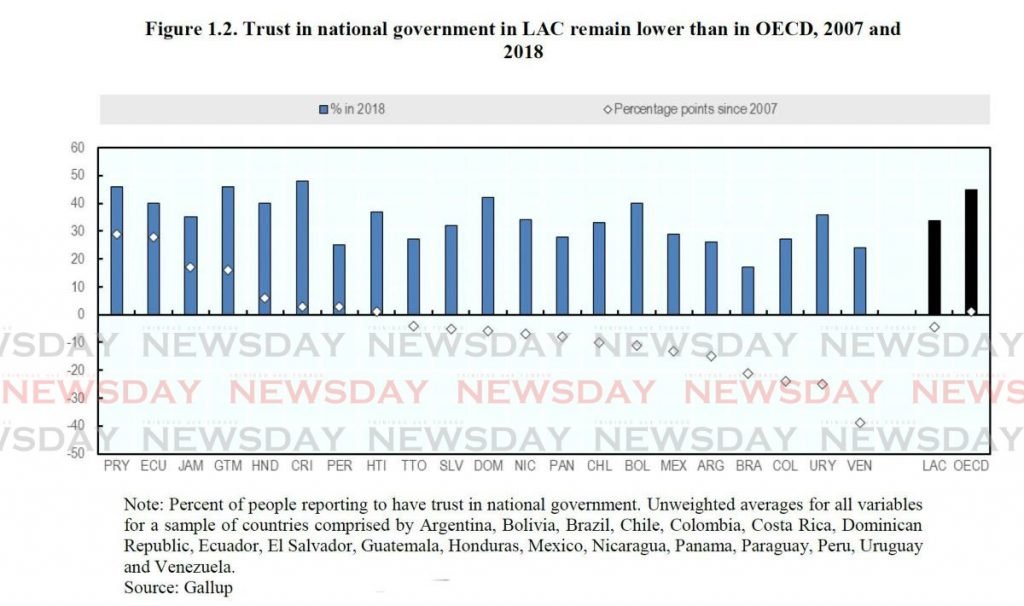Little trust in governments

Countries in Latin America and the Caribbean have made significant improvements to public welfare in the last two decades, a new report from the Inter-American Development Bank suggests, but these are in jeopardy and public trust in governments has declined.
Released Wednesday, the report, Government at a Glance 2020: Latin America and the Caribbean, matches the region’s progress with the countries that make up the Organisation for Economic Co-operation and Development (OECD). Latin American and Caribbean (LAC) countries continue to face challenges in designing and enforcing public policies that promote good governance and inclusive societies, the report said.
“Along with difficult economic conditions, such setbacks to previous progress have spurred declining levels of trust in public institutions. In order to sustain inclusive growth, Latin American and Caribbean countries need to continue implementing public sector reforms that promote fairness for all.” In 2018, only 34 per cent of the population in LAC regions said they had trust in the government, down four per cent from a decade before. In TT, the figure is just under 30 per per cent.
Governments in the region have so far failed to take advantage of the opportunities offered by an economic boom to ensure that growth becomes sustainable and truly inclusive, the study said. Productivity has not significantly improved while inequality, despite economic progress, remains very high, whether measured in income or other well-being outcomes.
Citizens are largely dissatisfied with public services and investments in infrastructure and education seem to be insufficient. Overall, access to and quality of public services varies widely and those who can afford it often opt out to private providers. In addition, there is a widespread perception in the region that politics and markets are rigged.
Among the study’s findings
Public sector integrity: Political finance is strongly regulated in the LAC region. In general, the de jure (legal right) quality of political finance regulation has improved in Latin America; it is often even stronger than in OECD countries. Overall, however, existing regulations often fail to be effectively enforced. Moreover, regulations on campaign spending by political parties or candidates are less widespread than in OECD countries, creating incentives for political campaigns to increasing spending and seek financing from dubious sources.
Transparency: In Latin America the de jure quality of right to information laws is on average stronger than in OECD countries. Yet, citizens in Latin America often do not trust or simply do not know how to engage and how to obtain relevant and credible information.

Social accountability: The region shows growing awareness in terms of open data policies with Colombia, Mexico, Brazil and Uruguay with the most advanced open data initiatives in the region. All countries in the region have taken some steps to integrate stakeholder engagement in their rule-making process and have also established, to varying degrees, methodologies to engage with stakeholders, including minimum periods and supporting documentation for consultation.
Public sector employment: LAC countries face the pressing challenge to deepen the professionalisation of their civil service. While the public sector in LAC countries tends to be comparatively small (12.3 per cent of total employment in LAC compared to 21.2 per cent in OECD countries), public employment in several LAC countries is not merit-based. In addition, public employment is usually comprised of low-skilled workers protected by strict contractual labour arrangements and managers appointed based on their political affinities. Many political leaders and parties in the region are using the public administration to build clientelist networks for electoral purposes. As a result, while there is wide agreement on the necessity to reform the civil service, there are political interests in maintaining the status quo.
Public procurement: Public procurement systems in the region have made significant progress towards enabling better accountability and mitigating corruption risks. Countries in Latin America have advanced in the implementation of e-procurement mechanisms that, amongst others, improves transparency and efficiency of public procurement. Yet the region still needs to advance in its efforts to streamline the public procurement into overall public financial management, budgeting and service delivery processes, which could lead to better utilisation of public resources.
Government reforms: the region faces coordination weaknesses at the level of central government, making it difficult for the mainstreaming and effective implementation of integrity policies throughout its public entities.
Institutional weaknesses in several dimensions of public governance may explain the vulnerability of many countries in the region to inefficiencies caused by waste, misuse and capture by interest groups as well as to exogenous economic shocks. An analysis of government spending in the region indeed reveals a widespread waste and inefficiencies that could be as large as 4.4 per cent of the region’s GDP.
Inequalities in the region may have entrenched a vicious cycle of elites using their power to ensure that policymaking continues to reflect their own vested interests and not the public interest, according to the study. Even when the right policies are introduced, their implementation often remains superficial and is not able to translate into practice and bring about change. Causes can be informal norms overriding formal institutions, vested interests pushing back against effective implementation, solutions copied from another country but not responding to the context, or a lack of adequately skilled workforce or leadership.
Said Emilio Pineda, IDB Division Chief for Fiscal Municipal Management, Institutions for Development Sector: “In order to sustain inclusive growth, the region needs to continue pushing public sector reforms that promote fiscal stability and fairness for all. Improving public sector integrity and fighting corruption must be at the heart of such efforts.”
Public trust rating
• As of 2018, 34 per cent of the population in the LAC region reported having trust in government, four percentage points lower than in 2007.
• Income inequality (measured by the GINI coefficient) has decreased in most LAC countries in the period 2000-2017. However, in 2017 income inequality was still higher in all Latin America and Caribbean countries than in the five most unequal OECD countries.
• Confidence in the judiciary is low but increased from 31 per cent to 34 per cent in LAC countries on average between 2007 and 2017.
• Citizens’ satisfaction with health care and education decreased from 55 per cent to 49 per cent and from 65 per cent to 63 per cent, on average, respectively.
• In 2018, LAC countries reported an average deficit of 4.3 per cent of GDP, 3.4 percentage points higher than in 2007.
• Gross debt reached 65 per cent of GDP in 2018 in LAC countries, an increase of 17.2 percentage points since 2007, reducing countries’ room for manoeuvre.
• LAC countries spend proportionately less than OECD countries on social benefits, such as pensions and conditional cash transfers (30 per cent of government expenditures compared to 41 per cent in the OECD countries in 2017), and more on grants and other expenses, such as capital and current transfers to other actors of the economy (10 per cent in the region compared to 6 per cent in the OECD).
• To address undue influence in elections, most LAC countries forbid anonymous political donations; however, 92 per cent of surveyed countries allow cash contributions, which make it difficult to track the sources of funds. Parties or candidates are allowed to give gifts to voters in 25 per cent of the countries.


Comments
"Little trust in governments"